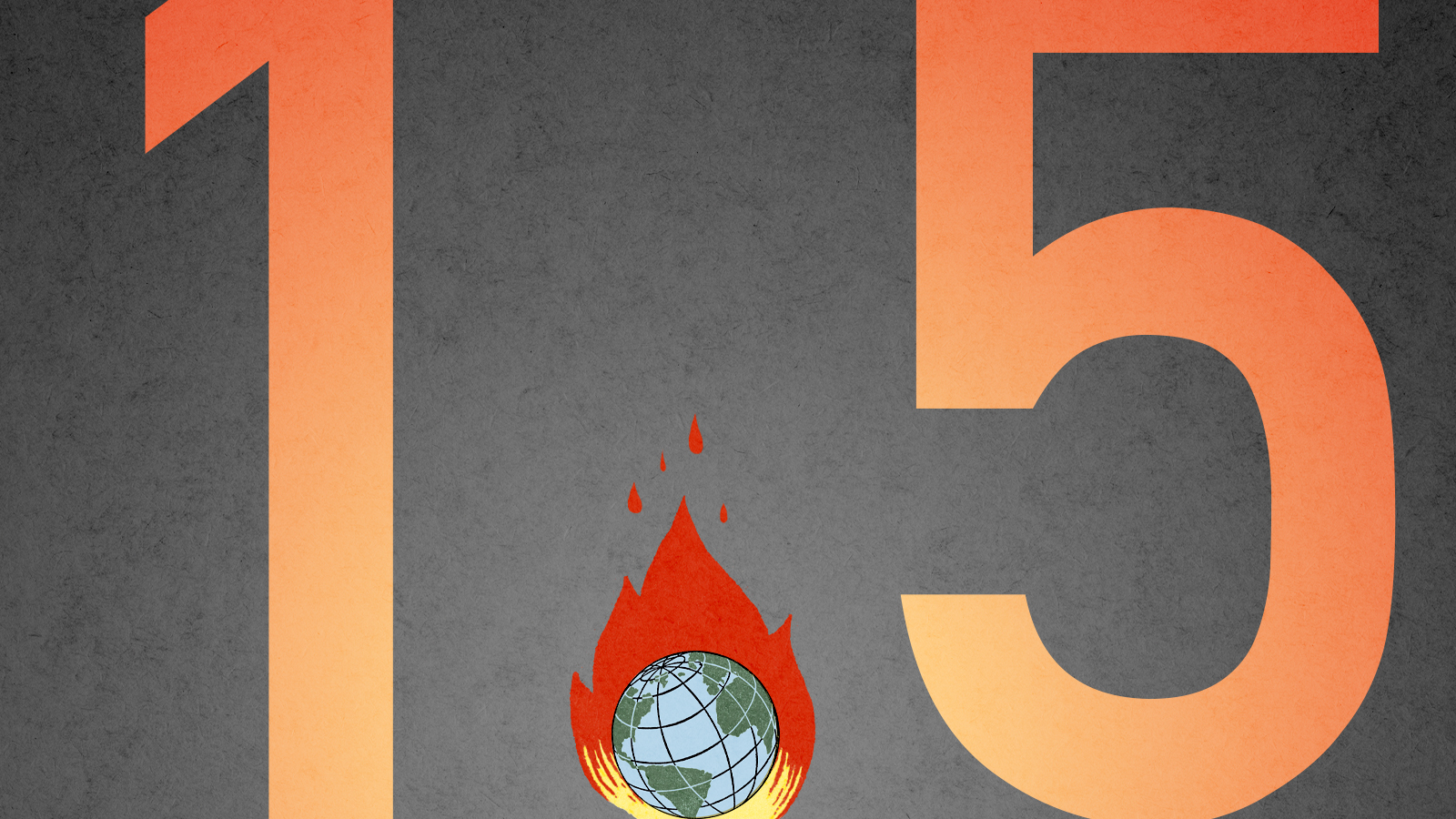The 'hard truths' of our climate failures
Why it's time to start thinking beyond 1.5 degrees Celsius


A free daily email with the biggest news stories of the day – and the best features from TheWeek.com
You are now subscribed
Your newsletter sign-up was successful
The world is perilously close to breaching the 1.5 degrees Celsius warming threshold enshrined in the 2015 U.N. Paris Climate Agreement. The World Meteorological Organization (WMO) said there is a 66% chance Earth's temperature will rise by more than 1.5 degrees by 2027. The odds of exceeding threshold have "risen steadily since 2015," when they were near zero, the WMO report said. Just last year the group put the chances of doing so within the next five years at 50-50, Reuters reported.
The temperature is unlikely to stay above the 1.5 degrees threshold for very long, at least at first. The temporary jump is partially linked to the upcoming El Niño Southern Oscillation. But fossil fuels are the underlying driver of long-term global warming, and they're still heavily in use. A 2022 assessment from the Global Carbon Budget warned that the world had less than a decade to significantly reduce its level of greenhouse gas emissions, or it will blow through the "carbon budget" allotted to keep global warming below 1.5 degrees Celsius in the long run. Meeting that goal is becoming less and less likely, forcing global leaders to grapple with some hard truths.
Is 1.5 degrees Celsius still within reach?
Not unless the world starts making way more of an effort to cut emissions. To meet the 1.5 degree goal, emissions would need to peak by 2025 at the absolute latest, which seems highly unlikely. The temperature increase is already at 1.2 degrees Celsius. The U.N.'s Intergovernmental Panel on Climate Change (IPCC) released a report in 2022 warning it is "almost inevitable" that the world temperature will surpass 1.5 degrees Celsius.
The Week
Escape your echo chamber. Get the facts behind the news, plus analysis from multiple perspectives.

Sign up for The Week's Free Newsletters
From our morning news briefing to a weekly Good News Newsletter, get the best of The Week delivered directly to your inbox.
From our morning news briefing to a weekly Good News Newsletter, get the best of The Week delivered directly to your inbox.
The coming years will likely act as an example of what the world will look like at 1.5 degrees. "This report does not mean that we will permanently exceed the 1.5 degrees Celsius level," said WMO Secretary-General Petteri Taalas. "However, WMO is sounding the alarm that we will breach the 1.5 degrees Celsius level on a temporary basis with increasing frequency."
Under current emissions-reduction efforts, the world is en route to 2.6 degrees of warming by the end of the century, according to the U.N. Emissions Gap Report. If every country were to meet its U.N. pledge, that could be reduced to a 1.8-degree increase. But governments are not prioritizing climate action. Of the 193 countries that signed on to the Paris agreement, only 24 brought actual plans to reduce their greenhouse gas emissions to COP27, the annual U.N. climate summit. The U.S.'s emissions increased by 1.3% in 2022 and global emissions increased by under 1% compared to 2021. "In terms of a trajectory and also in terms of policies, we are just not on track for 1.5 or even 2 degrees," Julia Steinberger, economist and professor from Switzerland's University of Lausanne, told CNBC.
Why are we missing the mark?
Political dithering and global economic pressures have made it hard for many countries to reach their goals. Gas prices spiked all over the world due to the war in Ukraine, as well as the Organization of the Petroleum Exporting Countries (OPEC) slashing oil production. With desperate times come desperate measures: President Biden softened his stance on oil and gas leases in light of the surging energy costs. He was criticized for his approval of the Willow Project, which is said to produce "180,000 barrels of oil per day at its peak," according to ConocoPhillips.
But there's also a problem of accountability. Some argue the Paris Agreement failed to hold countries to their emission-reduction commitments. The Economist wrote that the agreement "adopted a Herculean goal without any plausible plan for reaching it" and that global leaders "need to be more pragmatic, and face up to some hard truths."
A free daily email with the biggest news stories of the day – and the best features from TheWeek.com
What kinds of hard truths?
Going over 1.5 degrees Celsius "does not doom the planet," The Economist wrote, but the consequences will be dire indeed. Coral reefs will die out due to warming water temperatures; storms worldwide will strengthen; cities will flood due to rising sea levels, NPR explained. Coastal populations are at risk of losing their homes and habitats. Other nations will be more prone to droughts and water shortages, particularly in the Mediterranean region. NASA posited that close to 61 million more people would be exposed to drought conditions with 2 degrees of warming compared to 1.5 degrees. Higher temperatures would also cause many species to die off, and others to move northward towards cooler temperatures, which could lead to increased disease and potentially more pandemics.
For the most part, the highest polluting countries — the U.S. among them — are less likely to face the immediate ecological consequences of climate change, while smaller and poorer countries will bear the brunt. The African continent is already feeling the extreme effects of a warming world, and has demanded developed countries pay reparations for climate-related "loss and damage."
Should we be planning for an overshoot?
"Time for some realism," The Economist said. Understanding that the 1.5 degrees goal is almost certainly out of reach may be painful, but will also help nations get pragmatic and adjust their plans. For example, global investment in renewable energy should be tripled, and more attention should be put on climate adaptation, especially in developing countries. Richer nations should be actively working to invest in minimizing the damage.
Admitting that dangerous warming is inevitable opens the door for policymakers to "consider more radical ways to cool it," the publication added. Technologies like geoengineering and direct carbon capturing may be able to reverse some emissions and bring down temperatures over time but will require huge investment to bring to scale.
Is there any good news?
There are some glimmers of hope. Experts believe there does seem to be some "leveling off" of human emissions, especially since emissions from land-use changes like deforestation are 10 times less than fossil fuel emissions this year, CBS News reported. Also, the International Energy Agency forecast that Russia's war on Ukraine may actually speed up the transition to renewable energy because many nations are striving for energy independence.
Admitting defeat on 1.5 degrees allows world leaders an opportunity to refocus their efforts with new, achievable goals in mind, The Economist added. They should be "chastened by failure, not lulled by false hope." And just because the world may have missed the first target does not delegitimize the overall goal of limiting warming as much as possible. Experts have even posited that temperatures can be brought down by the end of the century. "We have to reduce ... greenhouse gas emissions as quickly as possible," said Pierre Friedlingstein, the lead author of the Global Carbon Budget. "There's no time to wait."
Devika Rao has worked as a staff writer at The Week since 2022, covering science, the environment, climate and business. She previously worked as a policy associate for a nonprofit organization advocating for environmental action from a business perspective.
-
 At least 8 dead in California’s deadliest avalanche
At least 8 dead in California’s deadliest avalancheSpeed Read The avalanche near Lake Tahoe was the deadliest in modern California history and the worst in the US since 1981
-
 Political cartoons for February 19
Political cartoons for February 19Cartoons Thursday’s political cartoons include a suspicious package, a piece of the cake, and more
-
 The Gallivant: style and charm steps from Camber Sands
The Gallivant: style and charm steps from Camber SandsThe Week Recommends Nestled behind the dunes, this luxury hotel is a great place to hunker down and get cosy
-
 How climate change is affecting Christmas
How climate change is affecting ChristmasThe Explainer There may be a slim chance of future white Christmases
-
 Why scientists are attempting nuclear fusion
Why scientists are attempting nuclear fusionThe Explainer Harnessing the reaction that powers the stars could offer a potentially unlimited source of carbon-free energy, and the race is hotting up
-
 Canyons under the Antarctic have deep impacts
Canyons under the Antarctic have deep impactsUnder the radar Submarine canyons could be affecting the climate more than previously thought
-
 NASA is moving away from tracking climate change
NASA is moving away from tracking climate changeThe Explainer Climate missions could be going dark
-
 What would happen to Earth if humans went extinct?
What would happen to Earth if humans went extinct?The Explainer Human extinction could potentially give rise to new species and climates
-
 Bacteria can turn plastic waste into a painkiller
Bacteria can turn plastic waste into a painkillerUnder the radar The process could be a solution to plastic pollution
-
 A zombie volcano is coming back to life, but there is no need to worry just yet
A zombie volcano is coming back to life, but there is no need to worry just yetUnder the radar Uturuncu's seismic activity is the result of a hydrothermal system
-
 'Bioelectric bacteria on steroids' could aid in pollutant cleanup and energy renewal
'Bioelectric bacteria on steroids' could aid in pollutant cleanup and energy renewalUnder the radar The new species is sparking hope for environmental efforts
